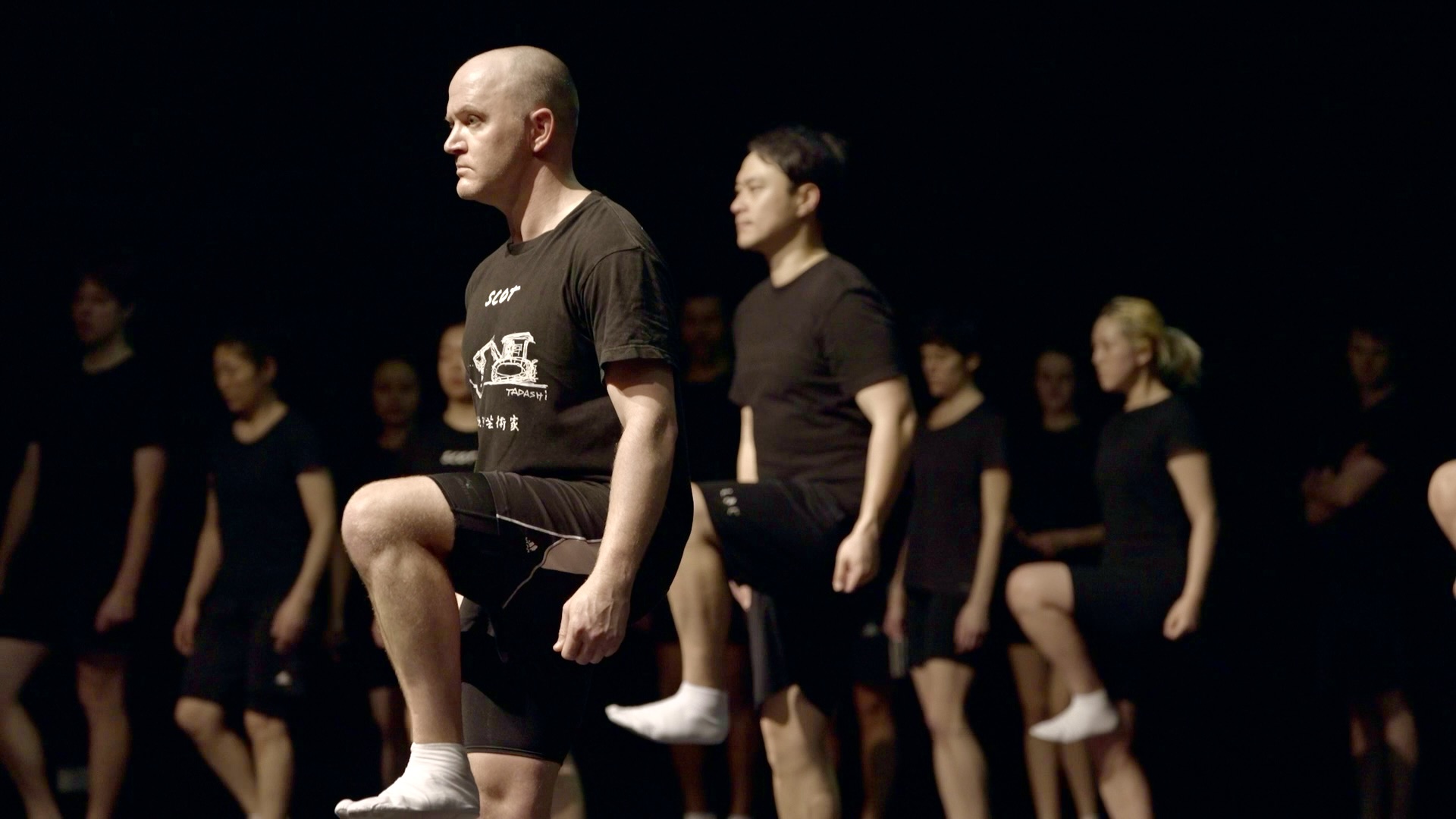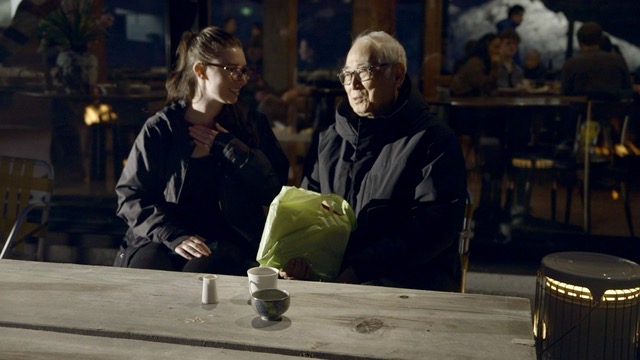This year, Dr. Chris Staley, a passionate scholar, artist, and longtime practitioner of the Suzuki Method of Actor Training, and his student, Amanda Baschnagel returned from an extraordinary journey—a pilgrimage, really—to the mountains of Toga, Japan. There, in the remote yet storied grounds of the Suzuki Company of Toga (SCOT), Dr. Staley deepened his two-decade-long relationship with a method that has shaped not only his craft, but his life.
TWENTY YEARS IN THE MAKING
Dr. Staley, Assistant Professor at the School of Theatre and Dance, first encountered the Suzuki Method as a freshman in college back in 2005. Since then, he has trained extensively with the Saratoga International Theatre Institute (SITI), a company co-founded by Anne Bogart in collaboration with Tadashi Suzuki himself. It wasn’t until 2017, however, that a pivotal moment reignited Dr. Staley’s connection to the work: seeing The Trojan Women performed by SCOT in celebration of SITI’s 25th anniversary. The experience was electrifying.
“I made a firm decision to go train with the Suzuki Company,” he reflects.
Now, years and multiple visits later—including attending the International Theatre Olympics in Japan—Dr. Staley is not only a practitioner but a bridge: bringing students along, researching, and preparing a book that honors and explores the enduring impact of this global theatre tradition. This year Amanda Baschnagel, a third-year MFA graduate student, was the fortunate student who went with him on the journey. For Amanda, this experience was the culmination of a journey that began in 2016, introduced first through the SITI Company in a workshop that sparked curiosity and admiration for the Suzuki Method of Actor Training and then reignited in graduate school by her instructor and mentor Dr. Chris Staley.
“He wrote me a recommendation and helped prepare me, both physically and mentally, for what would be the most rigorous experience of my life,” recalls Baschnagel. This training offered something rare: the ability to feel improvement in real time.

NOT ABOUT THE TECHNIQUES BUT THE ETHICS
Training with SCOT is not for the faint of heart. “You fail every single time,” Staley says. “And you fail again and again.”
That is the point. The Suzuki Method challenges the body’s center of gravity, stamina, and breath. The training is rigorous, elemental, and deceptively simple. “It’s not about the technique, it’s about the ethics that we bring in, neither is it about pretending,” Staley explains further: “It’s about discovering what your body can do today—not yesterday, not tomorrow. Today.”
Amanda agrees: “One insight that stood out came from a teacher who said, ‘The goal is for it to always get harder.’” This shift—from trying to master ease to embracing struggle—transformed how she saw her limits. Each day became less about endurance and more about discovery. “But what challenged me the most wasn’t the physicality—it was the mental fortitude.”
Each day in Toga is structured with intention. After communal meals and digestion time, trainees undertake hours of physically demanding exercises—called Discipline 1 through 6. Afternoons involve self-rehearsals, coaching, and even watching SCOT performances or curated films that reinforce core principles, like Romeo and Juliet through ballet. Everything orbits the same question: how do we connect the invisible, internal body to the visible world of performance?
Similarly, Amanda reflects, “I was first trained in a psychological approach to acting, which works great for other people, but I found it very limiting. I had a hard time translating what was happening in my head to my body. The Suzuki Method starts with the body and going in that direction (body to mind) is way more activating for me.”

GLOBAL DIALOGUE, SHARED ENERGY
For Dr. Staley, training with international artists in Toga is as instructive as the work itself. Conversations over coffee or post-training reflections with fellow participants—actors from across the globe—revealed how the Suzuki Method functions across cultures and identities.
“I always learn the most from my colleagues,” Staley shares. “What does the training mean to them? How do they use it? That always reshapes how I understand the method myself.”
On Amanda’s part too, the rigor, dedication, and the global nature of the cohorts brought another layer of richness to the training for her. Working with legendary artist Maki-San, known for her portrayal of Hecuba in The Trojan Women, left a lasting impression: “She conveys so much with stillness and silence. It was unlike anything I’ve ever seen. It changed how I understand presence and storytelling.”
This intercultural dialogue lies at the heart of what Suzuki called “spiritual globalization”—a theatre that builds bridges, not walls. “It’s not about nationalism,” Staley says. “It’s about creating citizens of the world through art. It doesn’t have to be a spiritual thing, but there’s something spiritual about bringing people together to share energy.”
A BOOK, A LEGACY
Dr. Staley’s deep engagement with the Suzuki Method has also sparked a book project—currently under proposal—that will coincide with SCOT’s 50th anniversary. This isn’t a technical “how-to” manual, but an edited collection that brings together multiple voices and perspectives. “It should feel like a conversation,” Staley says. “Not just my opinion, but a wider dialogue about the method’s evolution, misconceptions, and global reach.”
The book will explore questions of accessibility, pedagogy, and future-facing challenges, especially how the method can adapt across geographies, abilities, and performance traditions.

THEATRE AS PILGRIMAGE
To train with SCOT during their 50th anniversary season was, for Dr. Staley, a spiritual return. When asked if the experience can be likened to a pilgrimage, he replies, “Pilgrimage is the perfect word! When I train in Toga, I stand in the same spaces where my teachers once stood. There’s something deeply humbling about that.”
In a theatre landscape often dominated by commercialism and spectacle, the Suzuki Company offers a different vision: discipline, community, and purpose.
Back in classes at Texas Tech University, Amanda now carries with her not only physical skills but a renewed philosophy of rigor, community, and courage. “I discovered I’m much stronger than I thought. And I’m ready to bring that strength into my work.”
Asked to summarize the experience in three words, Amanda chose one: Ganbare—a Japanese expression that means “Let’s do this.” It’s not just a phrase; it’s a call to persist, to strive, and to honor the journey through discipline, struggle, and transformation.
Staley believes this ethos holds vital lessons for the future: “We don’t need more individual stars. We need companies. Communities. People willing to dedicate themselves to each other.” That, perhaps, is the Suzuki Method’s greatest legacy—not just stronger actors, but deeper human beings.
Want to learn more about the Suzuki Method or Dr. Chris Staley’s upcoming book project?
Stay tuned for announcements about public lectures, and publication updates.
If you're part of a theatre program or company, and you are interested in knowing more about the transformative power of the Suzuki Method, consider reaching out. As Dr. Staley says, “You don’t understand this work from a book. You understand it with your body.”
